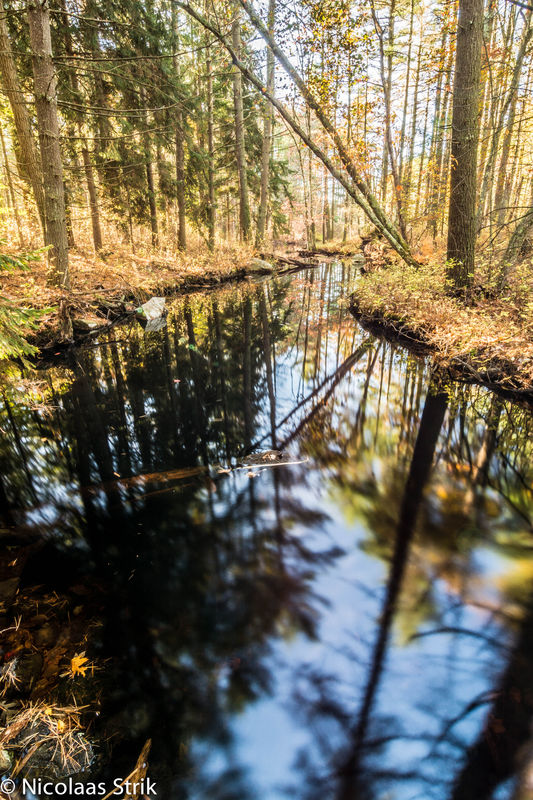How to remove so much reflection in water?
Nov 16, 2014 17:16:18 #
Is it simply putting a circular polarizer on the lens to remove all the reflections on a river or lake?
There are times when I feel reflections are just too much.
I'll post one of my pics that I think would be better as a clear or black water.
There are times when I feel reflections are just too much.
I'll post one of my pics that I think would be better as a clear or black water.
Nov 16, 2014 17:19:49 #
Nov 16, 2014 17:23:52 #
Rongnongno wrote:
By using a polarizing filter and/or changing your point of view..
Thanks Rongnongno. I had the polarizer on, so my next move (I assume) is to adjust the angle of the camera to the water.
Should I be pointed down more at a 45 degree angle?
Will being in the woods make the polarizer less effective to the water?
Nov 16, 2014 17:29:42 #
Greenguy33 wrote:
Thanks Rongnongno. I had the polarizer on, so my next move (I assume) is to adjust the angle of the camera to the water.
Should I be pointed down more at a 45 degree angle?
Will being in the woods make the polarizer less effective to the water?
Should I be pointed down more at a 45 degree angle?
Will being in the woods make the polarizer less effective to the water?
or lower, with more level angle. for me you maybe shooting down into the water to much. really good subject material.. do several change ups. :thumbup: :thumbup: :thumbup:
Nov 16, 2014 17:32:19 #
dirtpusher wrote:
or lower, with more level angle. for me you maybe shooting down into the water to much. really good subject material.. do several change ups. :thumbup: :thumbup: :thumbup:
Thanks dirtpusher! On my next hike, I'll try different angles. :thumbup:
Nov 16, 2014 17:36:15 #
Greenguy33 wrote:
I had more in mind to lower the camera and point it up as to prevent a disequilibrium when composing for the new level.Thanks Rongnongno. I had the polarizer on, so my next move (I assume) is to adjust the angle of the camera to the water.
Should I be pointed down more at a 45 degree angle?
Should I be pointed down more at a 45 degree angle?
Greenguy33 wrote:
No. It will deepen the sky color and likely other color that faded due to the light reflections.Will being in the woods make the polarizer less effective to the water?
Nov 16, 2014 17:39:21 #
Rongnongno wrote:
No. It will deepen the sky color and likely other color that faded due to the light reflections.
Thanks Rongnongno! I will get lower and try that, as well as a higher angle.
The great thing about digital is that the pics are cheap. :lol: :thumbup:
Nov 16, 2014 17:48:06 #
Just a dumb question to be sure we covered all bases here.
Was that the best you could do with the polarizer or did you forget to rotate it to that point?
Was that the best you could do with the polarizer or did you forget to rotate it to that point?
Nov 16, 2014 17:49:20 #
Greenguy33 wrote:
Thanks Rongnongno! I will get lower and try that, as well as a higher angle.
The great thing about digital is that the pics are cheap. :lol: :thumbup:
The great thing about digital is that the pics are cheap. :lol: :thumbup:
You must also coordinate your angle to the light source, Greenguy. Your polarizer will have maximum effect if your light source (hopefully the sun) is at a 90° angle to the direction your are aimed for your shot.
Your polarizer will not work well with "non-polarized" light...cloud-filled, overcast sky, incandescent lamps, fluorescent lamps, etc. Open sunlight works best.
Nov 16, 2014 17:51:48 #
TucsonCoyote wrote:
Just a dumb question to be sure we covered all bases here.
Was that the best you could do with the polarizer or did you forget to rotate it to that point?
Was that the best you could do with the polarizer or did you forget to rotate it to that point?
Not a dumb question. I don't recall adjusting the polarizer at all. Another thing I need to do.
I have the camera on a tripod. I need to take a deep breathe once it's composed and take my time and go through these steps.
Thanks for the reminder TusconCoyote! :thumbup:
Nov 16, 2014 17:52:58 #
Danilo wrote:
You must also coordinate your angle to the light source, Greenguy. Your polarizer will have maximum effect if your light source (hopefully the sun) is at a 90° angle to the direction your are aimed for your shot.
Your polarizer will not work well with "non-polarized" light...cloud-filled, overcast sky, incandescent lamps, fluorescent lamps, etc. Open sunlight works best.
Your polarizer will not work well with "non-polarized" light...cloud-filled, overcast sky, incandescent lamps, fluorescent lamps, etc. Open sunlight works best.
Thanks Danilo! I need to take that into consideration. :thumbup:
Nov 16, 2014 17:54:53 #
Greenguy33 wrote:
Is it simply putting a circular polarizer on the lens to remove all the reflections on a river or lake?
There are times when I feel reflections are just too much.
I'll post one of my pics that I think would be better as a clear or black water.
There are times when I feel reflections are just too much.
I'll post one of my pics that I think would be better as a clear or black water.
What kind of filter do you have? They are not all created equal. I think the time of day may be your biggest challenge though. The image you provided is a good example of what the harsh contrast of the sun can do in wooded area. I would try again at before sunrise, right after sunset or on a cloudy day to cut the glare and reflection.
Nov 16, 2014 17:58:00 #
mdorn wrote:
What kind of filter do you have? They are not all created equal. I think the time of day may be your biggest challenge though. The image you provided is a good example of what the harsh contrast of the sun can do in wooded area. I would try again at before sunrise, right after sunset or on a cloudy day.
Thanks for the suggestion mdorn! I think I was still using a Hoya at the time. I now use B+W.
Nov 16, 2014 17:59:44 #
Danilo wrote:
You must also coordinate your angle to the light source, Greenguy. Your polarizer will have maximum effect if your light source (hopefully the sun) is at a 90° angle to the direction your are aimed for your shot.
Your polarizer will not work well with "non-polarized" light...cloud-filled, overcast sky, incandescent lamps, fluorescent lamps, etc. Open sunlight works best.
Your polarizer will not work well with "non-polarized" light...cloud-filled, overcast sky, incandescent lamps, fluorescent lamps, etc. Open sunlight works best.
My CP works without direct sunlight to cut the glare in water. I'm not sure I understand. Is the goal a dark blue sky or cutting down the reflection and glare of the water?
Nov 16, 2014 20:02:44 #
mdorn wrote:
My CP works without direct sunlight to cut the glare in water. I'm not sure I understand. Is the goal a dark blue sky or cutting down the reflection and glare of the water?
I'm not assuming a desired result in the image created here, Mark, only the function of the polarizing filter. In an overcast, or cloudy daylight situation, we may or may not see a partial "effect" from our polarizer because at least a percentage of our available light has been reflected before illuminating the subject. Perhaps reflected from a cloud, or the top of a cloud, or from some other object. Once polarized light (sunlight, for example) is reflected it is no longer polarized, thus our filter will only function to some unknown degree.
In a controlled environment (studio, perhaps) we can "re-polarize" light by means of polarized theatrical gels, but outdoors we are at the mercy of naturally available light. Thanks for a very thought-provoking question, Mark! :thumbup: :thumbup:
If you want to reply, then register here. Registration is free and your account is created instantly, so you can post right away.






